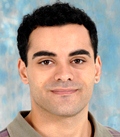

Computational approaches informing surface engineering for in vitro neural stem cell control.
PhD Supervisor(s): Dr Theocharis Kyriacou, Dr Paul Roach and Dr Rose Fricker.

There is a drive to generate neurons from stem sells, both as cell replacement therapies for neurodegenerative and acquired neurological disorders. High throughput strategies are under investigation although these are largely limited to experimental process methodologies. These are time consuming, costly and also limited by the need to use animal derived tissues.
Data from existing laboratory experiments can be used to optimise current practice by extrapolating multiple variables. Computational methods can be applied to extensively examine individual parameters and their interactions. The advantages of this refined hybrid approach are that future experimental work can be streamlined, i.e. reducing the number of iterations required to find viable solutions, thereby reducing the requirement of animals in regenerative medicine.
One of the main challenges facing stem cell differentiation is the in vitro control of cell responses to the micro-environment. Materials used for the production of cell cultureware, along with media components used to convey control, can be engineered to present pre-described characteristics.
Evolutionary optimisation algorithms can be used to find the properties of a micro-environment that would best meet the application of cells. This will be done in silico by using the xisting sparse data set (for previous lab experiments) in order to predict how each member of the evolutionary algorithm will be evaluated in vitro.